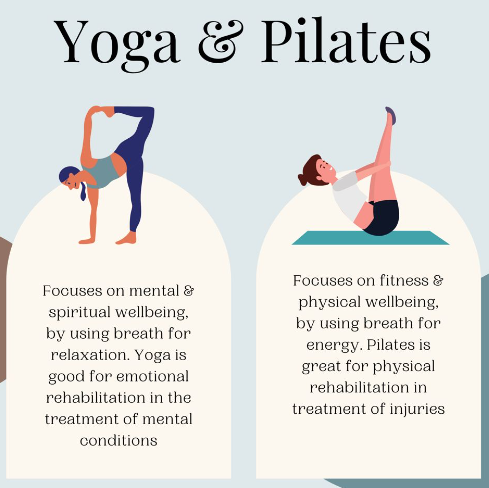In today's sedentary lifestyle, exercise plays a crucial role in maintaining overall health and well-being. Regular physical activity offers numerous benefits, both physically and mentally. In this article, we will explore in-depth the key reasons why exercise is important and how it can positively impact your life.
 |
| Why Exercise is Important |
Different Types of Exercise
There are various types of exercise, each with its own unique benefits. Some of the most popular types of exercise include:
- Cardiovascular exercise: This type of exercise involves activities that increase the heart rate, such as running, cycling, or swimming. Cardiovascular exercise helps to improve cardiovascular health and reduce the risk of heart disease.
- Strength Training: This type of exercise involves lifting weights or using resistance to build muscle. Strength training helps to increase muscle mass and bone density, reducing the risk of osteoporosis.
- Yoga and Pilates: These types of exercise focus on flexibility, balance, and mindfulness. They can help to improve overall well-being and reduce stress levels.
Why Exercise is Important
- Enhances cardiovascular health and reduces the risk of heart diseases: Regular exercise is vital for maintaining a healthy heart. It improves cardiovascular health by strengthening the heart muscle, increasing blood circulation, and reducing the risk of heart diseases such as heart attacks, strokes, and high blood pressure. Engaging in aerobic exercises like brisk walking, running, cycling, or swimming can significantly improve heart health.
- Helps in managing and preventing chronic conditions, such as diabetes and obesity: Exercise is an essential component in managing chronic conditions like diabetes and obesity. Physical activity helps control blood sugar levels, improves insulin sensitivity, aids in weight management, and reduces the risk of obesity-related complications. By engaging in regular exercise, individuals can better manage their condition and reduce the reliance on medication.
- Strengthens bones and muscles, promoting better mobility and reducing the risk of injuries: Regular exercise, particularly weight-bearing activities like weightlifting, resistance training, and even walking, helps strengthen bones and muscles. It promotes bone density, reduces the risk of osteoporosis, and improves overall muscle strength and endurance. Strong bones and muscles enhance mobility, stability, and balance, reducing the likelihood of falls and injuries, especially in older adults.
- Reduces stress, anxiety, and symptoms of depression: Exercise is a powerful stress buster and mood enhancer. Engaging in physical activity triggers the release of endorphins, neurotransmitters responsible for feelings of happiness and well-being. These endorphins act as natural stress and anxiety reducers, alleviating symptoms of depression and promoting a positive mental state.
- Improves mood and promotes a sense of well-being: Exercise has a profound impact on mental health. Regular physical activity stimulates the release of serotonin, dopamine, and norepinephrine, which are neurotransmitters associated with mood regulation and emotional well-being. This chemical response promotes a positive outlook, reduces symptoms of anxiety and depression, and enhances overall psychological well-being.
- Boosts cognitive function, including memory and concentration: Exercise not only benefits the body but also the mind. Physical activity increases blood flow and oxygen delivery to the brain, improving cognitive function. Studies have shown that regular exercise enhances memory, attention, and problem-solving abilities. It also reduces the risk of cognitive decline and age-related neurodegenerative diseases such as Alzheimer's.
- Helps in achieving and maintaining a healthy weight: Regular exercise, combined with a balanced diet, plays a crucial role in achieving and maintaining a healthy weight. Physical activity helps burn calories, increases metabolism, and promotes the development of lean muscle mass. It also improves body composition by reducing body fat percentage and preserving muscle mass, which is vital for long-term weight management.
- Reduces the risk of chronic diseases, including certain types of cancer: Leading a physically active lifestyle is associated with a lower risk of chronic diseases. Regular exercise can reduce the likelihood of developing various conditions, including certain types of cancer (such as breast, colon, and lung cancer), metabolic disorders, cardiovascular diseases, and even mental health disorders.
- Enhances immune system function, reducing the likelihood of illness: Engaging in regular exercise boosts the immune system's effectiveness, reducing the risk of illness and infection. Moderate-intensity exercise increases the production of antibodies and white blood cells, which help the body fight off bacteria and viruses. However, it's important to note that excessive or intense exercise can temporarily suppress the immune system, so finding the right balance is key.
- Improves sleep quality and promotes better sleep patterns: Exercise has a positive impact on sleep quality and duration. Physical activity increases the production of serotonin, a hormone that regulates sleep. It also helps reduce anxiety and stress levels, allowing for a more relaxed state conducive to better sleep. However, it's best to avoid exercising vigorously close to bedtime, as it can increase alertness and make it harder to fall asleep.
- Increases energy levels and reduces feelings of fatigue: Contrary to popular belief, exercise actually boosts energy levels and reduces fatigue. Regular physical activity improves blood flow and oxygen delivery, enhancing the efficiency of the cardiovascular system. This, in turn, increases energy production and reduces feelings of fatigue, allowing individuals to tackle daily tasks with increased vigor and stamina.
- Enhances flexibility, balance, and coordination: Incorporating exercises that focus on flexibility, balance, and coordination, such as yoga, Pilates, and tai chi, can significantly improve these aspects of physical fitness. Enhanced flexibility reduces the risk of injuries and improves overall range of motion. Improved balance and coordination increase stability and reduce the likelihood of falls, particularly in older adults.
- Boosts self-confidence and body image: Regular exercise contributes to improved self-confidence and a positive body image. Engaging in physical activity helps individuals achieve personal fitness goals, build strength and endurance, and improve physical appearance. These accomplishments boost self-esteem and promote a positive self-perception, leading to increased self-confidence and a healthier body image.
- Promotes better digestion and gut health: Exercise stimulates the muscles of the digestive system, aiding in the movement of food through the digestive tract and promoting regular bowel movements. Physical activity can help alleviate common digestive issues such as constipation and bloating. Moreover, exercise has been linked to a healthier gut microbiome, which plays a crucial role in overall gut health and immune system function.
- Increases longevity and improves overall quality of life: Regular exercise has been associated with increased longevity and a better quality of life. The numerous health benefits of exercise, including improved cardiovascular health, reduced risk of chronic diseases, enhanced mental well-being, and better physical function, all contribute to a longer and more fulfilling life. Engaging in regular physical activity not only adds years to your life but also improves your overall well-being, allowing you to enjoy life to the fullest.
How to Incorporate Exercise into Your Routine:
To make exercise a part of your daily life, consider the following tips:
- Setting realistic goals and creating a personalized exercise plan: Start by setting achievable goals that align with your fitness level and schedule. Creating a personalized exercise plan that suits your lifestyle, considering factors such as time availability and physical capabilities, will help you stay on track.
- Finding enjoyable activities that fit your interests and preferences: Engage in activities that you genuinely enjoy. Whether it's jogging, swimming, dancing, hiking, or playing a sport, choosing activities that align with your interests increases the likelihood of sticking to your exercise routine and finding pleasure in the process.
- Prioritizing consistency and gradually increasing intensity and duration: Consistency is key when it comes to exercise. Start with manageable exercise sessions and gradually increase the intensity and duration over time. This gradual progression allows your body to adapt and reduces the risk of injury or burnout. Remember, even short bouts of exercise can be beneficial, so find opportunities to move throughout the day.
- Seeking professional guidance and support, if needed: If you are new to exercise or have specific health concerns, consider seeking professional guidance. A fitness professional or personal trainer can provide expert advice, design a safe and effective exercise routine, and ensure you perform exercises with proper form and technique.
IV. FAQs about Exercise:
Here are answers to some commonly asked questions about exercise:
❓ Why is regular exercise important for weight loss?
Regular exercise is crucial for weight loss because it helps create a calorie deficit. By burning excess calories through physical activity and improving metabolism, exercise aids in weight management and contributes to overall fat loss.
❓ How much exercise should I aim for each week?
The American Heart Association recommends at least 150 minutes of moderate-intensity aerobic exercise or 75 minutes of vigorous-intensity aerobic exercise per week. Additionally, incorporating muscle-strengthening activities at least two days a week is recommended for overall health.
❓ Can I exercise if I have a chronic condition or injury?
In many cases, exercise can be beneficial for individuals with chronic conditions or injuries. However, it's important to consult with your healthcare provider or a qualified exercise professional to determine the appropriate exercises and modifications based on your specific condition or injury.
❓ What are some tips for staying motivated to exercise regularly?
Staying motivated to exercise can be challenging at times. Here are a few tips to help you stay on track: find an exercise buddy or join a fitness community for support and accountability, set achievable goals and track your progress, vary your workouts to keep them interesting, reward yourself for reaching milestones, and remind yourself of the positive impact exercise has on your health and well-being.
❓ Is it better to do cardio or strength training for overall health?
Both cardiovascular exercise and strength training are important for overall health. Cardiovascular exercises like jogging, swimming, or cycling improve heart health and endurance, while strength training exercises like weightlifting or bodyweight exercises build muscle strength, improve bone density, and support overall body composition. A balanced exercise routine that includes both types of exercises is generally recommended for optimal health benefits.
👉 Read more posts with the same topic
Regular exercise is a powerful tool for improving both physical and mental well-being. From enhancing cardiovascular health and reducing the risk of chronic diseases to improving mood, sleep quality, and self-confidence, the benefits of exercise are vast. Embrace a physically active lifestyle, set realistic goals, and make exercise a priority in your life to enjoy a healthier, happier, and more fulfilling journey towards overall well-being.










0 Comments